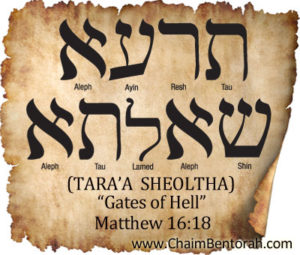ARAMAIC WORD STUDY – GATES OF HELL – TARA’A SHEOLTHA Taw Resh Ayin Aleph Shin Aleph Lamed Taw Aleph
Matthew 16:18: “And I say also unto thee, That thou art Peter, and upon this rock I will build my church; and the gates of hell shall not prevail against it.”
 I’ve listened to many arguments over whether the rock upon which the church is built is Peter, Jesus or Peter’s confession of faith. Yet, no one seems to argue or show any concern as to what the gates of hell that will not prevail against the church really are.
I’ve listened to many arguments over whether the rock upon which the church is built is Peter, Jesus or Peter’s confession of faith. Yet, no one seems to argue or show any concern as to what the gates of hell that will not prevail against the church really are.
Our first assumption is that it is the hell of fire and brimstone and the forces of hell itself, the demonic beings cannot prevail against the church. What bothers me about this is why call it the gates of hell and not the forces of hell? How can a gate prevail against anything except someone trying to get in or out? Why would the church try to get into hell and why would the church try to get out of hell if not in it in the first place.
I don’t think hell is the best rendering here. In Greek, it is the word hadou or hades which is a place where the departed spirits go until the day of resurrection. In Aramaic, it is the word sheol which is the grave, again a place where the dead go. The word gates are what creates a problem. The word in Greek is pylai which is a door or entrance from which you enter or exit. The word for prevailing is katischuo which is a word for overpowering, getting the upper hand. The door of the grave or the place of the dead spirits will not overpower the church?
The word in Aramaic for the gate is tara’a which is an opening or a portal, a passageway. The word for prevail is chasan which means to subdue or overpowering just like in the Greek. Still, even in the Aramaic, it does not make sense, how can a portal to the grave or place of the dead overcome the church in the first place. They seem to be unrelated unless we go with the traditional explanation that Jesus is referring to the powers of hell but I am troubled over why He just does not say the powers of hell, why speak in cryptic terms like the gates of hell?
The term gates of hell had to be very familiar to the Jews of the first century. Indeed it was. I found numerous references to this in the Jewish Talmud. But the one I think is appropriate for this Scripture passage and it is found in Baba Bathra 84a “Is not the sun red at sunrise and at sunset? It is red at sunrise, because it passes by the roses of the Garden of Eden, at sunset, because it passes the gate of sheol.” In other words, the sun is red as it sets in the West because it reflects the fires of sheol but is red as it rises to the reflection the roses of the Garden of Eden. The Garden of Eden is said to be the resting place of the souls of righteous and sheol is the resting place of the souls of the unrighteous.
To the first century Jew, the gates of hell was a symbol of the resting place of the unrighteous and death. Jesus may very well have been saying that not even death or the attacks of the unrighteous will stop the church. Or he might even be making a reference to His death and possibly all the martyrs to come will not stop the church from moving forward.
Indeed history has shown as even today that when the church is persecuted it only grows stronger. The church in China is the best example. Under persecution, the church is united, no phonies in the church during persecution. No one plays the game when belonging to Jesus could be prison, torture or death. Not even the threat of death can stop the church. Anyway, you look it neither death, the attacks of the demonic, the unrighteous or even the death of the founder of the church Jesus Himself cannot stop the church because Jesus conquered death.








As far as the East is from the West……
This scripture makes sense now. I’ve never been able to find a satisfying interpretation. Actually, though, your teaching had now created a thirsty to study it more.
Thank you
Debra
I find it difficult to understand Paul’s comments in 1 Thess 4:16 compared to 2 Cor 5:8. . Currently I understand ” Our Spirit, soul and body”- so 3 parts. I assume our spirit and soul will be wirh Jesus and our immortal body will arise. Your study I know is on a different subject
So grateful for your teaching particularly that the righteous go to paradise. I hope to increase in studying your teachings.